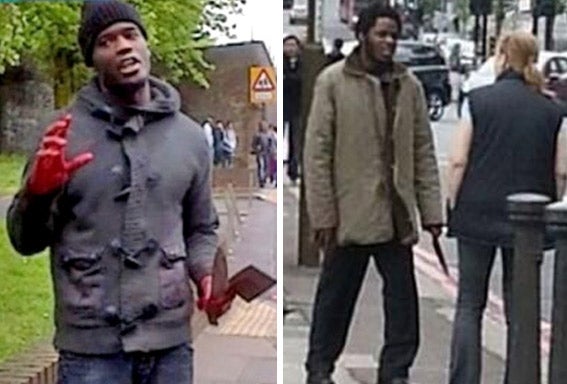The Independent's journalism is supported by our readers. When you purchase through links on our site, we may earn commission.
Woolwich attack: We have a duty to report these images, but editors face difficult ethical questions
Reporting on this sadistic murder allows us to see - and see through - its perpetrators

Your support helps us to tell the story
From reproductive rights to climate change to Big Tech, The Independent is on the ground when the story is developing. Whether it's investigating the financials of Elon Musk's pro-Trump PAC or producing our latest documentary, 'The A Word', which shines a light on the American women fighting for reproductive rights, we know how important it is to parse out the facts from the messaging.
At such a critical moment in US history, we need reporters on the ground. Your donation allows us to keep sending journalists to speak to both sides of the story.
The Independent is trusted by Americans across the entire political spectrum. And unlike many other quality news outlets, we choose not to lock Americans out of our reporting and analysis with paywalls. We believe quality journalism should be available to everyone, paid for by those who can afford it.
Your support makes all the difference.The front pages of newspapers this morning are shocking, and rightly so. What happened should shock and disgust us, and should challenge everybody in Britain today. But the images will also cause disquiet, and raise the legitimate question about whether the media should display in Technicolor the brutal acts of desperate attention-seekers, who are actively seeking the coverage in the first place.
Almost every single title has splashed on the now iconic image of the apparent terrorist, arms stained elbow-high, reeking with the blood of an innocent man, meat cleaver in hand, wild staring eyes, fervently clamouring for the notice of the world for what he had done. (The Daily Express did not, preferring something more neutral, presumably to allow them the freedom to share the page with a picture of the Duchess of Cambridge. Apparently she is still pregnant, and decided to wear a cheery shade of yellow.)
I saw the papers come in last night on Sky News. What was striking was that we were discussing the still images of a video (first shown by ITV, endlessly retweeted, and finally appearing on the BBC) that Sky News itself had declined to show.
This was a brave editorial decision (which has not garnered much attention) and should make us reflect on the ethics of media coverage of extreme acts. I am not sure I entirely agree with what Sky did, but they should be applauded for taking a stand based on their own sense of ethics, of what a responsible broadcaster should do in a fast-moving and highly-charged situation.
The arguments against running shots of the violent footage split into questions of taste and ideology. On the taste front, children (and adults) may well be disturbed by the gore of what was a vicious act. But I would argue that it is impossible to protect anyone from something as significant as this: information now pervades shared existence to such an extent that the iconography of extreme violence will become fixed whatever individual decision is taken by the traditional media.
And more importantly we have a right to know what has happened in our streets. It is not incitement to report factually on newsworthy events: the people responsible for this outrage should be condemned out of their own mouths. By seeing their desperation, we also see why their cause is futile. We can recognise that the bloody murderer was not an advocate against British foreign policy, or for any reasonable ideology. He was someone crazed by a mistaken faith in an orthodoxy and world-view that led him to forget the most important truths about shared humanity.
And humanity is the reason that the images matter. It is right for us to focus on the fact that real blood has been shed, of a real person, with a family now shattered by grief. Now we have heard the ravings of the murderers, and seen their dreadful work, so we should now be able to dismiss them.
The real ethical question for the media now rests on the respect that must be shown to those who know and love the victim. He will be named, and his family must be given the chance to grieve privately. That is when the thoughtful considerations of editors will matter the most.
Join our commenting forum
Join thought-provoking conversations, follow other Independent readers and see their replies
Comments